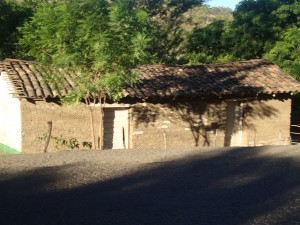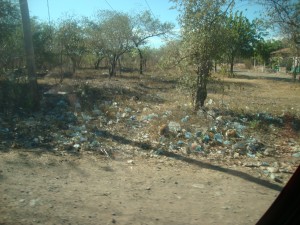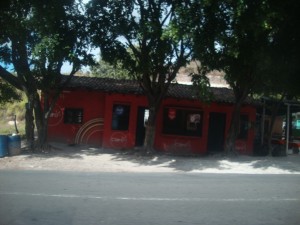On January 18th we embarked to Honduras, not exactly sure about the work we were going to develop within healthcare there, but with a lot of expectations and willingness to help others. Many meetings and a lot of preparation were held prior the trip, besides the fundraisers we were doing. It was definitely a lot of work, and it will continue like this until the end of this semester. However, all the work is absolutely worth it. Our trip was awesome.
We arrived in Tegucigalpa, Honduras’ capital around midday. Kristi, Marc and Andy, members of the Central America Relief Effort (CARE), were waiting for us at the airport. We had lunch in a wonderful restaurant downtown and then we headed to Pespire, a town in the Choluteca region. During the ride, Andy started explaining to us how our next days would be, helping people in three different towns in the South of Honduras. In each town we would go to schools or another building in town and build a clinic to receive people from the region for the day and at no cost. At arrival, Barraza, one of CARE members, would get their information, as name, age and we were responsible for taking their blood pressure. After that, they would go to the general physician, eyes doctor and dentist. All medicines prescribed by the doctor would be available at the “farmacia” for free. After that, they would get donated clothes that CARE receives or glasses, in case the eyes doctor had prescribed so.
Andy explained that our role in the clinics was to take their blood pressure, lead them to the doctor, organize and find medicines in the farmacia, hand them the clothes or help the dentist Gabi. In some towns we were also playing with the kids while their parents were with the doctor. Therefore, we were developing a hands-on work, interacting with the Hondurans directly and feeling very well integrated to the CARE group. Doubtlessly, this made our experience way more fruitful, and the learning was frequent.
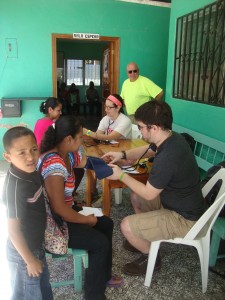
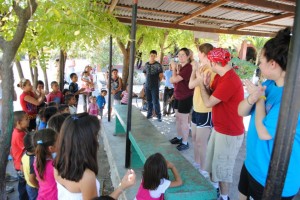
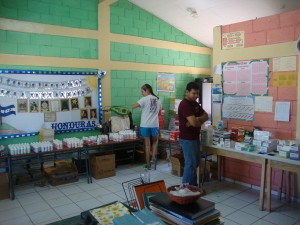
If it was either taking blood pressure or playing with the kids, each one of these duties that we developed provided us with a great opportunity to know more about that people and about their conditions. In one of the towns, San Marco de Colón, I was especially surprised with the high level of malnutrition. We saw kids who could not stand on their feet, and many adults who didn’t have enough information to know how to deal with it. Many people had really high blood pressures. We saw people who walked for hours to get to the clinic, because that was the only healthcare they would get maybe during the year. However, it was impossible not to be moved with the smile they were receiving us and the gratitude they showed us for being there. On my first day, while taking blood pressure with Alana, an old lady came to us, holding our hands and we could see in her eyes that she was happy because we were there. There was nothing left to say, we didn’t need to understand any Spanish to know exactly what she meant.
Outside of the clinics, we also learned a lot. For instance, just by driving on the roads, we could see a lot of trash on the street. However, at least if there was trash, it was a sign that there were people living there, and that they were eating something, consuming something to survive. I would get more worried about the regions we went were there was absolutely no trash, but we could see houses by the road. I couldn’t understand how people there would get water or food or any other kind of services. This would explain why some people were malnourished. The roads were terrible, and accessing those remotes areas was almost impossible by car. In one town we went, 15 minutes away from the borders with Nicaragua, it was easier for the population to go to a Nicaraguan hospital instead of going to the nearest Honduras hospital in the area. All this taught me the value of small things we take for granted in our countries. Especially for me, coming from Brazil, I could see that this same reality of extreme poverty exists in my home country, however, I was lucky enough to never go through any kind of these experiences, although this reality was always so close to me.
It was also very interesting to notice the international companies’ influence in the Hondurans healthcare. For example, one of the reasons that we had “dentistas” in the clinics was for teeth extraction. Many Hondurans had bad oral health because a lot of Coke and other soft drinks were consumed for being cheaper than treated water, which could not be found in the houses. This is a good example of how the Honduran government is extremely weak right now and how international companies were able to control people’s opinion to buy their products. It was also impressive that even in this really remote places we could see advertisements of Coke or Claro (a Brazilian telephone carrier controlled by a Mexican business), as we can see in these pictures:
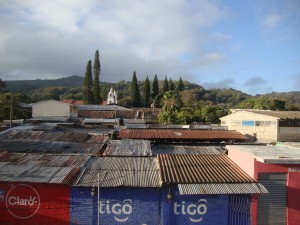
In addition, I could not write without mentioning some small moments that led to deep learnings, which I am going to take for my whole life. On our last day we met a lady, Rosa, who was 105 years old. At first, I was escorting her to the doctor, afraid she would fall, but she was actually walking faster than me. Heading to the “farmacia”, the doctor prescribed her only “vitaminas” and “ibuprofeno”. When we asked her what was her secret, she told us not to worry about anything, that was the secret. She was clever and could understand everything that we were saying. I learned that day something that people live their whole lives without knowing.
Another fact that marked my trip was on our second to last day of trip. We had a cultural day with the Hondurans in a remote place, which I unfortunately don’t know the name. We played many games with them, and they were willing to show us their culture and it was a great moment for us to show them a little from the American culture as well.
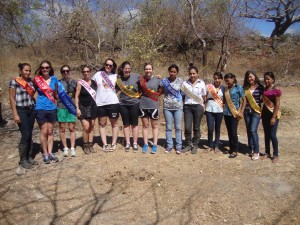
After our “día de cultura” activities, heading back to the car in a 20 minutes walk, a little girl held my hand and stared walking me back to the car. At first, no problems, because there were some other Hondurans with us so I thought she must be with them. But then they started walking to their houses and nobody called the girl to go with them. So I started getting afraid; “what if this girl is thinking that I’m walking her back home as if I know where she lives?” But ok, we kept walking, and talking along the way, when some one pointed me her house, so before she left I asked her for a hug. She hugged me and then I said “Dios le bendiga” (God bless you). I thought to myself “this was why I came here”. There is nothing better than a five-year-old, adorable kid who doesn’t know you but blesses you anyways. I think I will never forget her smiley face when she was saying goodbye and and wishing me a safe trip.
On our last day of reflection, Andy, asked us for a word to summarize our experience, and I mentioned “wonderful”. I explained that I think it’s very interesting who in English words are put together to mean something. For example, beautiful – full of beauty, powerful – full of power; and our trip was wonderful – full of wonder, because it taught me so much in every single moment of it.
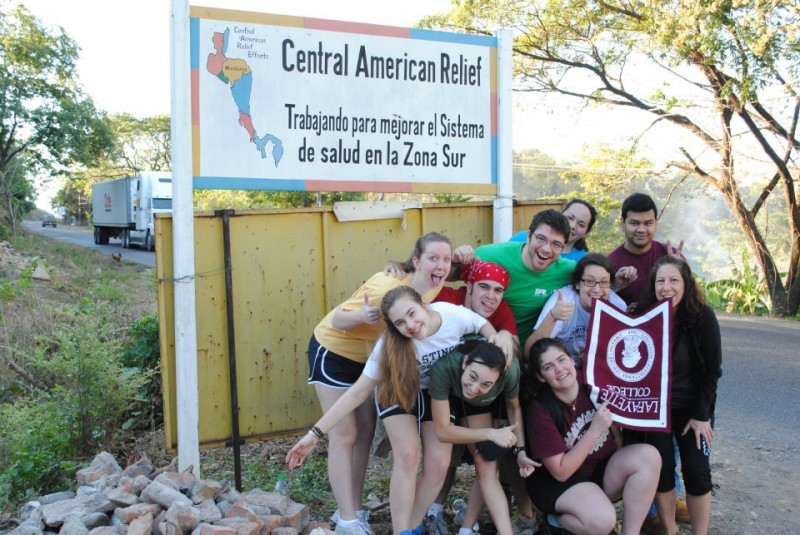
By Amanda Furtado Sampaio

